How to Plan a Trip to Yunnan
Located in southwest of China, Yunnan Province boasts the most splendid natural landscapes varied by majestic Jade Dragon Snow Mountains, jaw-dropping Tiger Leaping Gorges, labyrinth-like Stone Forest and breathtaking Yuanyang Rice Terraces. These natural gems could be explored in multiple ways by plenty of trekking and cycling routes. Furthermore, Yunnan spoils shutterbugs for choices with its palette-like Dongchuan Red Land and enchanting water spots like Erhai Lake and Lugu Lake.
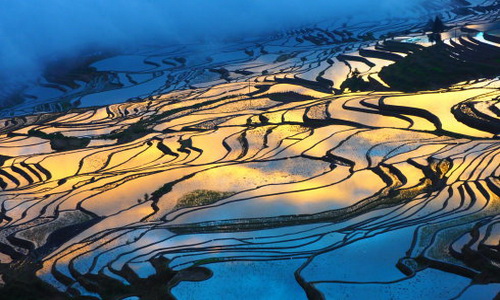
As home to 25 minority groups, Yunnan Province is blessed with diverse and colorful ethnical cultures demonstrated by dramatically different costumes, residences, customs and festivals. The existing old towns and villages in Dali and Lijiang reveal the authentic life and art of Bai and Naxi people, while Hani people in Yuanyang would show you their magnificent masterpiece of agriculture, the rice paddies. A trip to Yunnan enables you to have an impressive glimpse into China's distinctive mix of humanity.
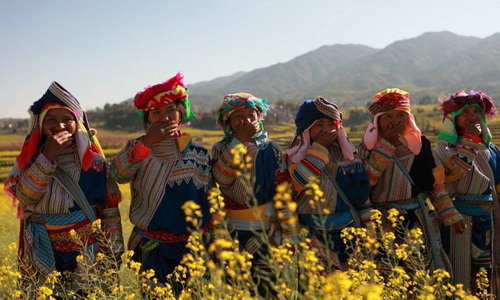
Generally, Yunnan is endowed with a pleasant and mild climate suitable for travel all year round. Most of the cities perched in the north of Yunnan are of high elevations up to 1,000 meters, while the southern areas belong to typical tropical climate. The average annual temperature is about 17°C. Visitors are unlikely to suffer the scorching heat in summer or freezing coldness in winter. The hottest month is July with average temperatures ranging from 21°C to 27°C, while January is the coolest period with average temperatures varying from 8°C to 17°C.
Although Yunnan had distinct rainy season from late May to August, visitor's sightseeing could be hardly affected if preparing rain gears. Besides, there is a large temperature difference between daytime and night, and the weather could be constantly changeable in the mountainous areas, so wearing layers is always suggested.
- Kunming - The Spring City & Home to the Stone Forest
- Dali - Ancient Towns, Erhai Lake and Minority Exploration
- Lijiang - A UNESCO World Heritage Old Town
- Shangri-La - A Fairytale Land in Real World
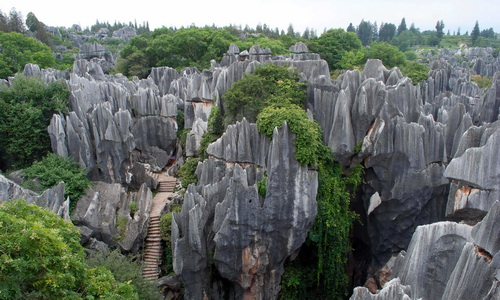
Kunming, chosen as the entry city by most visitors, is usually the first stop of a Yunnan tour, which presents you a pleasant and mild weather all year round. The city would not only bewitch you with the startling nature wonders like Stone Forest and Dongchuan Red Land, but also with its lively local life in the Green Lake Park and the vivacious bird-flower market. Yuanyang Rice Terrace and Jianshui Ancient Town could also be reached by several hours' drive from Kunming, which are superb destinations for shutterbugs.
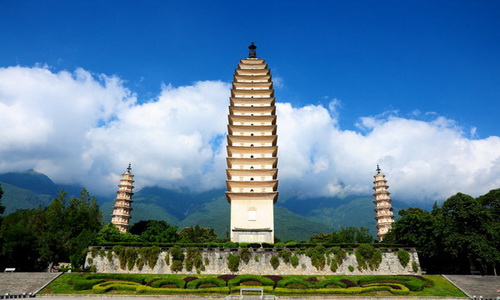
Dali is a must-go city for its picturesque landscapes and unique minority culture. With the enchanting Cangshan Mountain, Erhai Lake and Three Pagodas as the backdrop, Dali unveils its romance by its time-weathered ethnic residences and trendy bars that echo with each other in old towns and villages. The hidden gems Shaxi and Xizhou also greatly enrich your Yunnan tour with a taste of authentic countryside in China southwest.
The charms of Lijiang lies in the old towns, where one could have a deeper discovery of minority culture. As the hometown of Naxi people, Lijiang along with Shuhe and Baisha showcase the local ethnic customs and activities by a cluster of traditional timber houses and local markets. Besides, the Tiger Leaping Gorge and magnificent Jade Dragon Snow Mountain make Lijiang one of the best hiking destination in China.
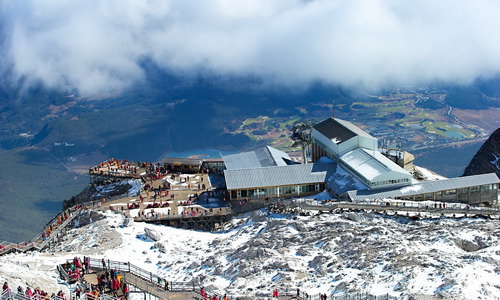
Perched about 3,280 meters above sea level, Shangri-La is blessed with unrivaled natural beauty that has inspired the Lost Horizon by James Hilton. Home to the rarest species, Potatso National Park in Shangri-La is a nearly untouched fairyland embraced by holy snow mountains, alpine forests and boundless meadows. Adjacent to Tibet, Shangri-La is dwelled by a large number of Tibetans who still retain their exotic ethnic culture and lifestyles.
- Lugu Lake: Lugu Lake is an otherworldly place where one can discover the extant walking marriage customs of the Mosuo minority of matriarchy.
- Yuanyang: The spectacular Yuanyang Rice Terrace is a must-see of four seasons for travelers seeking for a Yunnan photography tour.
- Jianshui: Jianshui is a time-honored town with an array of ancient architectures, where you could immerse into the delicate courtyards, gardens and bridges dating back to 600 years ago.
- Puzhehei: For visitors in search of an off-the-beaten-track destination in Yunnan, Puzhehei inhabited by Miao, Yao, Yi, Bai and Zhuang people could let you indulge in the poetic and idyllic countryside floating on broken lakes.
- Bamei: Bamei is the last unspoiled escape of Yunnan which had not been found by outsiders for thousands of years. It would be a wonderful experience to take a boat through an underground river to discover the most primitive village life of locals.
- Xishuangbanna: It is the best place to explore the wild elephants in the tropical rainforest and experience the unique ethnic culture of Dai people.
- Meili Snow Mountain: It is one of the most magnificent snow mountains in the world which offers breathtaking sunrise views over the golden peaks.
- Puer: Puer is the hometown of the famous Pu-erh Tea, where visitors could have an in-depth glimpse of the tea plantation and tea culture along the Ancient Tea Horse Trail.
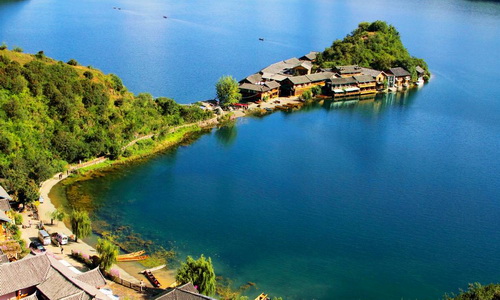
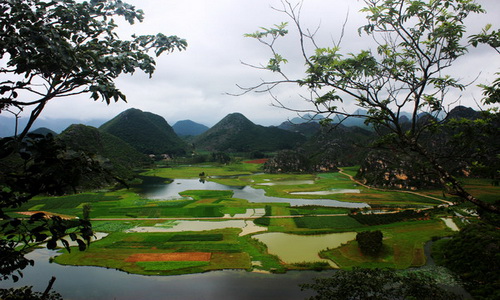
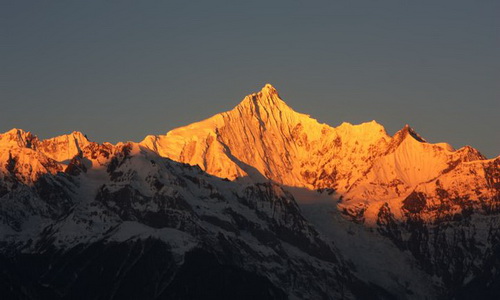
Yunnan has formed well-developed transport modes including a couple of airports and massive highway and railway networks. You can travel to Yunnan by plane, train and bus. Kunming, the capital city, is the gateway into Yunnan Province for most travelers.
By Air
In addition to the entry city Kunming, Lijiang, Dali and Shangri-La could be reached by air, too. By far, Yunnan has easy air connections to major domestic tourist cities like Beijing, Guangzhou, Chengdu, Xian, Hangzhou, Shenzhen, Shanghai, Chongqing and Guilin, and international hubs like Hong Kong, Taipei, Bangkok, Singapore and Seoul.
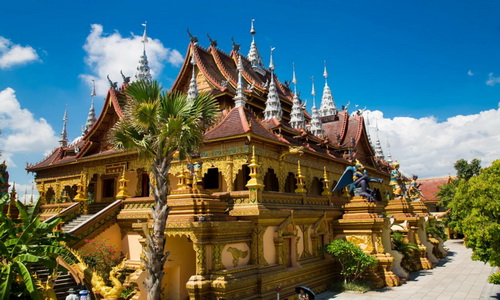
By Rail
Now travelers can make a trip to Kunming Yunnan by bullet trains from most big cities across China, including Beijing, Shanghai, Guilin, Xiamen, Chengdu, Hangzhou, Shenzhen, Guangzhou, Nanjing, Wuhan and Zhengzhou. The high-speed trains with travel duration less than 5 hours would be a perfect travel option beating over flights. There are also international trains running from Kunming to Vietnam for travelers planning a pre or post trip to Southeast Asia.
By Coach
Yunnan develops a network of highways accessible from all directions, especially from adjacent provinces such as Sichuan, Guizhou, Guangxi and Tibet. There are even cross-border long-distance buses from Laos and Vietnam.
Travel by Train
Kunming – Dali: Frequent bullet trains are available with a duration of about 2 hours. Dali – Lijiang: Plenty of ordinary trains run between Dali and Lijiang within two hours on the way.
Travel by Bus
Long-distance buses could lead you to almost every tourist destinations of Yunnan, including Dali, Kunming, Lijiang, Shangri-la, Yuanyang, Jianshui and Puzhehei. Taking a coach to move around Yunnan is favored by most backpackers. However, for foreign travelers, a private vehicle is the most recommended travel method to make transfers between destinations, as it is a time-saving and easier choice free of language barrier.
Generally, 5 days are needed at least for a Yunnan tour. Yunnan boasts much more than you could imagine, and 6-9 days are enough to cover the most essential nature wonders, historical relics, ethnic minorities, ancient villages and wonderful trekking trails. Hereunder list the most classic travel routes with durations for your reference.
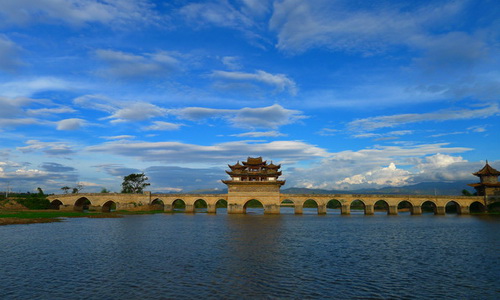
- 5 Days: Classic Yunnan Discovery (Kunming – Dongchuan)
- 6 Days: Red Land Photography Tour (Kunming – Dali – Lijiang)
- 6 Days: Rice Terrace & Minorities Culture (Kunming – Jianhsui – Yuanyang)
- 5 Days: Yunnan Classic Hiking Tour (Lijiang – Tiger Leaping Gorge)
- 5 Days: Ancient Towns Discovery (Dali – Xizhou – Shaxi)
- 9 Days: Highlights of Yunnan (Kunming – Dali – Lijiang – Shangri-La)
If you have any other inspirations, our travel expert would be delighted to tailor-make your dreamy Yunnan tour according to your personal interests and pace.
Yunnan provides a full range of accommodation options to fit most budgets and tastes, varying from international 5-star hotels to lovely inns. Among the most popular tourist cities like Kunming, Dali, Lijiang and Shangri-la, you could easily get lodging options for 5-star hotels and high-end boutique hotels with superb service. In some remote areas of Yunnan, like Jianshui, Yuanyang and Puzhehei, no international hotel brands are served, but there are plenty of affordable and exotic guesthouses featuring in residential style of ethnic minorities to suit your fancy. Language is not a problem as most of them could have simple English conversation with foreign travelers.
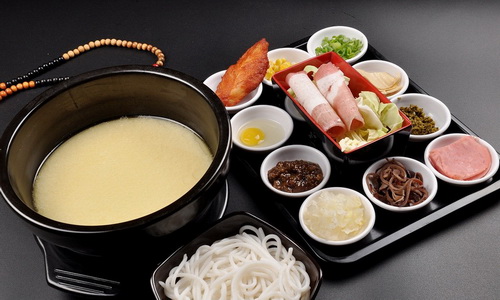
Eating in Yunnan is more of an adventure of your tongue. Most cuisines in Yunnan get a strong, spicy and hot taste that could be paralleled to Sichuan food. Since Yunnan adjoins Tibet and foreign countries like Burma and Laos, their food absorbs a blending of multiple flavors across Southeast Asia. Besides, Yunnan cuisine is enriched by a variety of incredible ingredients that you could never meet anywhere else in the world. Yunnan people are addicts to dishes of wild animals, edible wild herbs, mushrooms and even insects. Though it may sound a bit overwhelming, you could still find something ordinary to eat. Without spice or weird ingredients, the Rice Noodle is definitely the most popular food of locals worthy of a try. There are also western restaurants in most tourist cities catering for your need, and thus eating is never a problem in Yunnan.
- Water-Splashing Festival
- Torch Festival
- Bullfight Festival
- The March Fair
Date: 14th to 16th of April
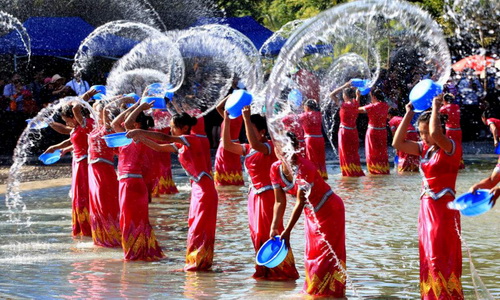
As the new year time of Dai People, it is a festival of revelry when people dressed in traditional costumes splash water with basins and buckets upon each other praying for health and blessings. Dragon boat racing and folk dance shows are held, too.
Date: 24th to 26th of the sixth lunar month
Torch Festival is the grandest festival for multiple ethnical minorities including Yi, Bai, Naxi and Jinuo. Yunnan minorities observe the festival by a series of lively activities, such as a big bonfire party for singing and dancing, bull fight, cockfighting and horseracing.
Date: 25th day of the first lunar month
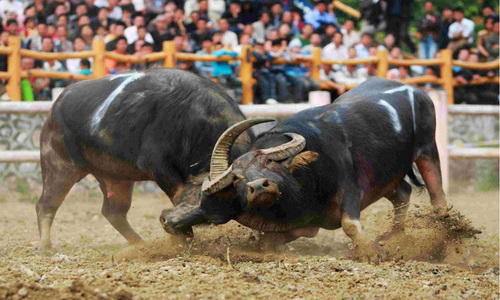
The Bullfight Festival is widely celebrated in many Miao villages of Yunnan. Miao is an ethnic group who consider bulls as a symbol of diligence and bravery. People dress up in their best attires to watch the fierce and stirring bullfight to preserve their century-old tradition.
Date: 15 - 21 of the third lunar month
The March Fair Festival is one of the most significant festivals celebrated by the Bai Ethnic People in Dali. During the festival, Bai people gather for trading agricultural commodities, and there are wonderful events held for celebration, such as horse race, folk operas and singing competition.
You can easily make extension trips to neighboring provinces, like Guizhou for a deeper exploration of minorities Miao and Dong people, Guangxi for beguiling karst landscapes and Tibet for the plateau landscapes and mysterious Tibetan Buddhism.
Get to know more about our Guizhou & Yunnan Minorities Culture Tour









